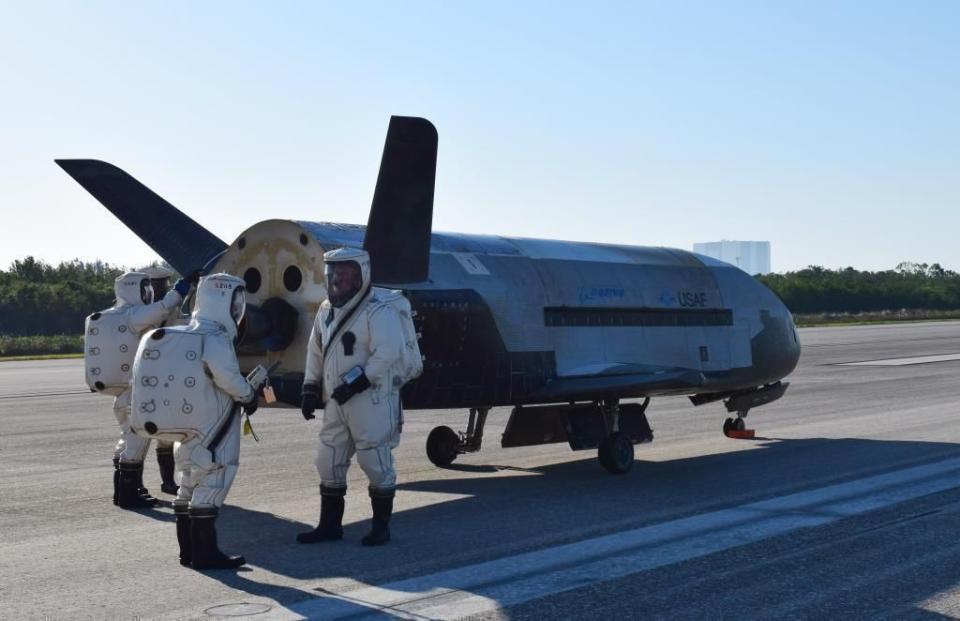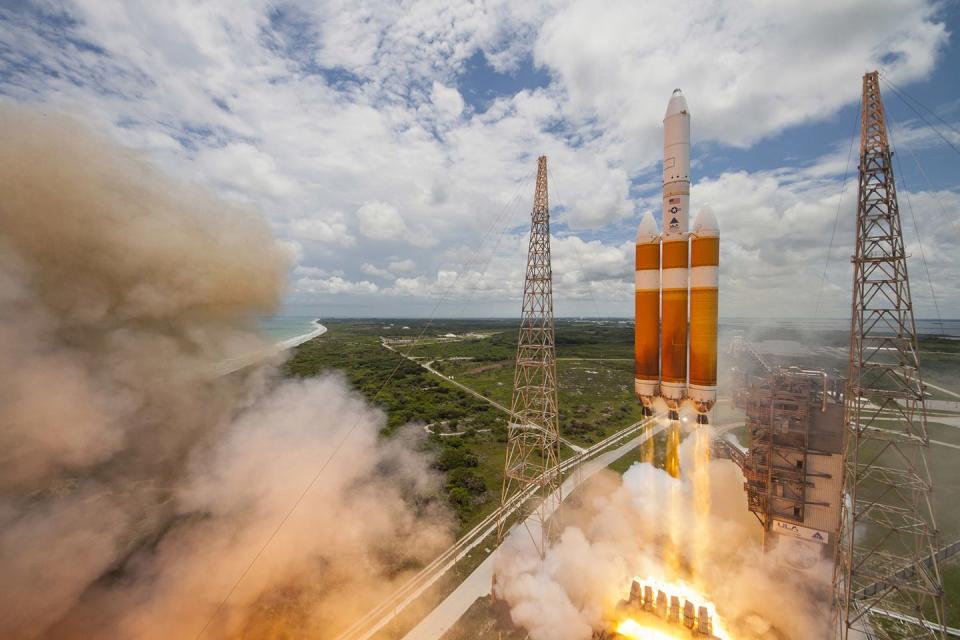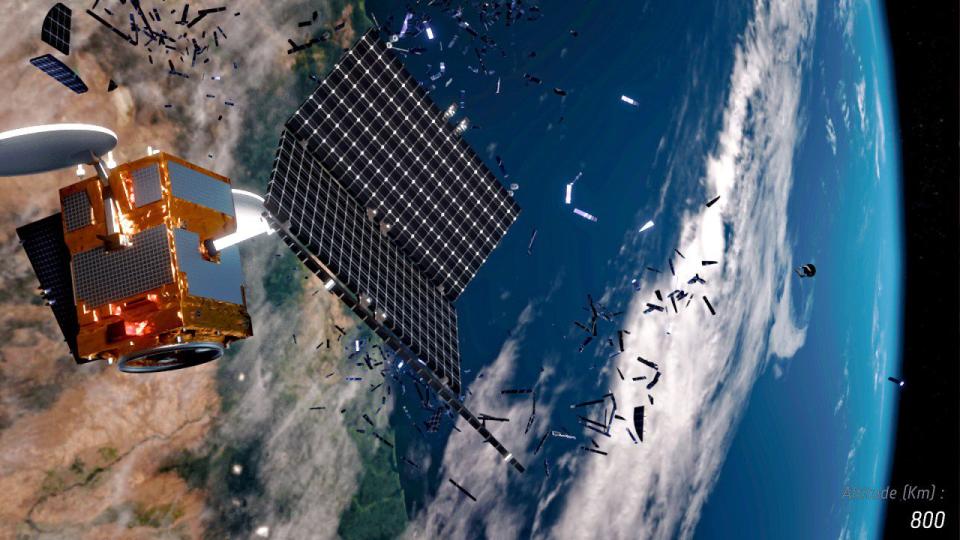Does the U.S. Need a Space Force?

By the 2020s, the United States, China, and Russia aim to have fleets of satellites in orbit armed with robotic arms for servicing spacecraft or lasers to knock debris into the atmosphere to burn up. But those sats could easily be turned on enemy satellites in an age when militaries are more reliant than ever on signals from orbit. Space is becoming a battlefield.
Sean O'Keefe has watched these developments as a Syracuse University professor specializing in national security law, and in his roles as Secretary of the Navy under President George H. W. Bush and NASA Administrator under George W. Bush. O'Keefe says countries have now attained space capabilities "that were only a matter of science fiction in years gone by."
President Trump's response to these threats is to propose a Space Force, a sixth branch of the military to manage off-planet defense. On Monday, Trump announced he is "hereby directing the Department of Defense and Pentagon" to immediately start the process to create a Space Force.
O'Keefe, however, questions the wisdom of ordering a massive restructuring of the Pentagon-especially when space defense is already part of the military's repertoire.
Pearl Harbor in Space

If you were going to attack the United States, a logical first move would be to blind the country by taking out its satellites. This could be accomplished with new fleets of "worker-bee" satellites-which Brian G. Chow, a physical scientist with the RAND Corporation, has called "de facto weapons"-or with more conventional tactics, such as shooting sats with ground-launched missiles or jamming their electronics. The possibility of a "space Pearl Harbor" is one justification for a new military branch-one that would have its own Chief of Staff, more funding, and more authority to conduct space-related missions.
However, one big issue with the president's directive is that he does not have the authority to create a Space Force. Such an action would require new legislation from Congress outlining the service's role (Article 10 of the United States Code) and funding provided through the National Defense Authorization Act (NDAA).
"This would be among probably the top two or three significant changes to the National Security Defense Act, which was enacted in 1947, which created the Department of Defense," O'Keefe says. "So, this is a pretty big deal."
Currently, the U.S. Air Force primarily handles America's space defense-specifically Air Force Space Command, which tracks and operates fleets of satellites to spot missile launches, conduct intelligence gathering, operate GPS, and communicate all that information to warfighters on the ground. But space missions are spread across the armed forces. The Army and Navy, for example, share responsibilities for ballistic missile defense.
"In each one of those military services... [there is] research and development on kinetic capabilities, intercept capacities, all the different things that were articulated and dreamed about as part of the old Strategic Defense Initiative," O'Keefe says, referring to the missile defense concept "Star Wars" under the Reagan administration. "It's now becoming a reality."

With such a wide range of space activities spread across the Armed Forces, it's hard to know exactly what Trump means when he says he wants to create a Space Force (The Department of Defense Public Affairs office did not respond to a request for comment.) But O'Keefe says there is another option for the Commander-in-Chief-one that he could carry out without the need for Congressional acts.
"There are other ways to accomplish [space defense] by taking the primary service that's responsible for it now, the Air Force... and tell them with no uncertain terms that this ought to be the number one priority in your upcoming budget profile and in your strategic planning, or else... we're going to reconsider everything you do within your department," O'Keefe says. "And that would garner a tremendous amount of attention and take far less consideration in terms of creating all this bureaucratic apparatus and everything else."
Recipe for Infighting
O'Keefe has called the Space Force "a solution in search of a problem." To his mind, such a plan is nothing more than a massive reorganization of operations that the military already conducts.
"This is a recipe for having a very significant bureaucratic food fight inside the Pentagon," he says. "How many generals and admirals do you have? It's a recipe for the kind of infighting that has really consumed a hell of a lot of unnecessary time."

The former secretary of the navy compares the prospect of creating a Space Force to the Goldwater–Nichols Act signed by Reagan in 1986. The bill enacted a massive reorganization of the Defense Department, which gave more power to the Chairman of the Joint Chiefs of Staff and restructured the chain of command.
"The Goldwater-Nichols Act prompted and forced a greater joint consideration of Army, Navy, Air Force, Special Operations, Marine Corps-everybody all participating in a way that's most effective," O'Keefe says. "Largely it's moved in that direction, but it's taken a long time. ... So the idea that everybody would debate within the Defense Department and resolve expeditiously how to accomplish something akin to that in record time-I don't think so."
One major problem, O'Keefe says, is that space defense is "a pretty wide definition." The Navy and Air Force operate astronomical observatories, for example. Would these be part of a Space Force?

Congress has tried to tackle these questions. In last year's NDAA, Congressmen Mike Rogers (R-AL) and Jim Cooper (D-TN) included legislation requiring the Air Force to create a "Space Corps." The Space Corps was ultimately removed from the bill by the Senate in favor of significant restructuring of space defenses within the Air Force, consolidating most of the authority under Air Force Space Command.
Congressman Rogers' office did not respond to a request for comment, but he said Thursday at a Mitchell Institute event in Washington D.C., "I want to get space out of the Air Force bureaucracy and out of a subordinate position," as reported by Space News. The congressman also mentioned that he is looking forward to a report issued last year on whether or not an independent branch for space defense is needed, and he expects the Pentagon to come up with a plan in the coming months as well.
Rogers' comments underscore that some within the House of Representatives don't think changing commands within the Air Force is enough. The 2019 NDAA passed by the House outlines plans to create a new United States Space Command under STRATCOM to oversee joint space operations, as well as a new Numbered Air Force (NAF) with its own wings and squadrons devoted to space. These provisions are absent from the version of the bill passed by the Senate, though, and O'Keefe says the upper chamber of Congress is "diametrically opposed" to such plans.
"You have to solve this argument of, exactly what do you want it to do?" O'Keefe says. "What do you want it to build?"
Space Diplomacy
On the ocean you have the law of the sea. In the air you have air traffic control. If a fighter jet approaches another country's destroyer, the ship will demand the pilot declare his intentions. In space, you have no such thing. The world needs "basic rules of the road" to avoid conflicts and collisions in orbit, O'Keefe says. "Absent that, you're going to have real safety considerations."

On June 20 and 21, the international community gathered to celebrate the 50th anniversary of the United Nations Conference on the Exploration and Peaceful Uses of Outer Space. The meeting was billed as "an opportunity for the international community to gather and consider the future course of global space cooperation for the benefit of humankind."
To lead in space, perhaps the United States should focus on leading in these types of international discussions rather than pounding its chest about a new branch of the military. The Space Force, for all its flair, is more a matter of desk space at the Pentagon than one of orbital battles with space shuttle door gunners.
Space Force or no Space Force, O'Keefe says it's critical to outline America's specific priorities for space defense and means to accomplish those missions. "There's been no effort to even address that point. I can barely call what was articulated [on Monday by the president] a vision. It was more of just an expression. You know, that's about it."
You Might Also Like
